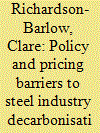|
|
|
Sort Order |
|
|
|
Items / Page
|
|
|
|
|
|
|
| Srl | Item |
| 1 |
ID:
192705


|
|
|
|
|
| Summary/Abstract |
The environmental impact of the transport sector has a significant contribution in the carbon emissions. To reduce fossil fuel consumption and promote clean fuel, many countries are considering hydrogen as an alternative fuel and a bridge to sustainable development and achieve net zero target. Indian government has taken multiple policy initiatives to promote hydrogen fuel adoption in India. But nevertheless, the major presence of the multiple barriers limits the mass adoption of hydrogen as a preferred fuel. Therefore, identification and assessment of the key internal and external barriers of the hydrogen fuel vehicles adoption is required to mitigate the climate change issues. This study has identified and analyzed the barriers. The criticality assessment of the barriers is done by fuzzy based hybrid approach analytic hierarchy process. Later, sensitivity experiments are conducted to verify the robustness of the model. The findings of the study show that technical barriers are most critical barriers in the adoption of hydrogen fuel vehicles in India. The result of the study also indicates that India would require to build the hydrogen supply network and infrastructure, improve consumer awareness, favourable policies and develop efficient production technology for the mass adoption of hydrogen as a fuel.
|
|
|
|
|
|
|
|
|
|
|
|
|
|
|
|
| 2 |
ID:
176722


|
|
|
|
|
| Summary/Abstract |
The UK has some of the worst performing residential buildings in the EU from an energy efficiency perspective. Natural gas remains a dominant feature of existing and new-build housing with strong historical, technical, and social barriers to change. Consequently, the residential sector is responsible for significant shares of national emissions and has a strong role to play under ambitious net zero targets.
|
|
|
|
|
|
|
|
|
|
|
|
|
|
|
|
| 3 |
ID:
186485


|
|
|
|
|
| Summary/Abstract |
UK power sector decarbonisation is an important step toward achieving the country’s 2050 net zero target. Two uncertainties are particularly relevant to this effort: future electricity demand and biomass availability, the latter due to the potential for negative emissions in the power sector from biomass energy with carbon capture and storage. Using the dynamic simulation model FTT:Power, this work explores the impacts of different power sector policy portfolios on emissions, electricity prices, and government spending under these uncertainties. It finds that deep decarbonisation of the UK power sector is possible, including substantial negative emissions, but that this will require ambitious and diversified policy. Carbon pricing is found to be the single most important decarbonisation policy instrument. Direct regulatory phase-out of unabated fossil fuel power generation is similarly crucial for power sector decarbonisation, and for building resilience to biomass availability uncertainty. That said, under all policy portfolios biomass availability plays a key role in enabling net negative emissions in the power sector. This suggests the importance of securing and improving UK biomass supply, and of decarbonisation outside the power sector to reduce the need for negative emissions to begin with.
|
|
|
|
|
|
|
|
|
|
|
|
|
|
|
|
| 4 |
ID:
180160


|
|
|
|
|
| Summary/Abstract |
The energy supply system is undergoing enormous change to deliver against cost, security of supply and decarbonisation objectives. Robust decisions on the provision of infrastructure requires integrated models to perform analytics across the entire energy supply chain.
|
|
|
|
|
|
|
|
|
|
|
|
|
|
|
|
| 5 |
ID:
186440


|
|
|
|
|
| Summary/Abstract |
Global climate targets have highlighted the need for a whole-systems approach to decarbonisation, one that includes targeted national policy and industry specific change. Situated within this context, this research examines policy and pricing barriers to decarbonisation of the UK steel industry. Here the techno-economic modelling of UK green steelmaking provides a technical contribution to analysis of pricing barriers and policy solutions to these barriers in the UK specifically, but also to the broader industrial decarbonisation literature. Estimated costs and associated emissions projections reveal relevant opportunities for UK steel in contributing to national climate and emissions targets. Modelling demonstrates that green steelmaking options have been put at price disadvantages compared to emissions-intensive incumbents and that fossil-free hydrogen-based steelmaking has lower emissions and lower levelised costs than carbon capture and storage options, including top gas recycling blast furnace (TGR-BF) with CCS, and HIsarna smelter with CCS. Two primary policy recommendations are made: the removal of carbon pricing discrepancies and reductions in industrial electricity prices that would level the playing field for green steel producers in the UK. The research also provides relevant policy considerations for the international community in other industrial decarbonisation efforts and the policies that must accompany these decarbonisation choices.
|
|
|
|
|
|
|
|
|
|
|
|
|
|
|
|
| 6 |
ID:
176720


|
|
|
|
|
| Summary/Abstract |
The phasing out of conventional fossil fuel road vehicles is one of a number of potentially disruptive transport and energy policies. The implied technical substitution alone may be too slow to contribute meaningfully to meeting ‘net zero’ carbon reduction targets. This paper uses established modelling techniques and prospective scenario analyses in a UK case study to investigate what the impacts might be if we were more ambitious, how much disruption is needed to meet climate goals, the role of lifestyle and social change, and the potential implications for key actors in transport energy systems. Existing policies may neither hit carbon reduction targets nor make the early gains needed for a Paris-compliant trajectory. Deeper and earlier reductions in carbon and air quality emissions can be achieved by more ambitious but largely non-disruptive change of a 2030 phase out that includes (plug-in) hybrids. The earlier phase outs combined with lower demand for mobility and car ownership would make significant contributions to an emissions pathway that is both Paris compliant and meets urban air quality goals. Some disruption for technology providers, business and government can be expected in the more ambitious cases. The paper concludes by discussing key policy implications and recommendations.
|
|
|
|
|
|
|
|
|
|
|
|
|
|
|
|
| 7 |
ID:
180863


|
|
|
|
|
| Summary/Abstract |
Delivering net zero by 2050 will require governments to utilise all available abatement opportunities, yet current policy largely ignores socially-driven mitigation in favour of technological innovation in the energy sector. Past energy transitions have typically taken several decades, but policymakers remain confident that low carbon technology can be deployed in time for a 2050 mitigation target. We consider the potential for social transitions to deliver emissions reductions within this time frame. Based on detailed analysis of 12 past transitions, we develop frameworks for technological and social transitions which draw out the relationships between progress, policy and diffusion. Using our generalised frameworks we compare the duration of transitions, finding that the technological transitions in our study take on average four decades longer than the social transitions to go from initial conception to market or behaviour saturation. Our evidence suggests that policymakers who continue to rely on technology transitions to reduce emissions will be unable to deliver climate targets by 2050. By engaging with the public to stimulate social transitions governments could have more impact, more swiftly. Only by utilising both technological and social transitions can policymakers hope to achieve net zero emissions by 2050.
|
|
|
|
|
|
|
|
|
|
|
|
|
|
|
|
|
|
|
|
|